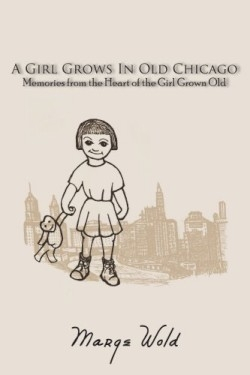A Girl Grows in Old Chicago
Memories from the Heart of the Girl Grown Old
Marge Wold’s poetry collection A Girl Grows in Old Chicago focuses on her early years. Here each street corner and each piece of family lore is remembered. The poems are as much a tribute to the city Wold grew up in as they are entries in a literary scrapbook. With sing-song rhymes and nods to the past this poetry collection is bound to appeal to readers who want to disappear into a time where things seemed easier and when the world was simultaneously very large and very small.
Wold’s images and descriptions provide the pulse for her poems. The city comes alive for the reader even for those unfamiliar with “Old Chicago.” These poems are a love letter to Chicago and an elegy to a time now gone. In “The Sounds of Chicago” Wold writes “I’ll never again wake up to the ring / of metal wheels on frozen snow / and the plop-clop of the horse’s hooves / as her tired legs pull the milkman’s wagon / down the quiet street on her wintry way.” Here the memories are shined new again. These poems are both art and historical documents.
Wold has an eye for line: Her poems are broken in such a way that each line reads like a story within a story. In “The Sounds of Chicago” the echo of a time now gone the “crackling of a [street car’s] conductor” lingers because of the way the following lines are broken: “to power lines overhead and dead dead is the voice / of a conductor calling out the street names of home.” Even for someone from another generation this fizzling of an institution is moving.
Wold’s pride to have been raised in Chicago is clear: the urban sprawl was her playground. But the poems in this collection could do with some sculpting. Occasionally Wold tries to hit readers over the head with the point or moral of her poems and this makes the poems less effective. For example in “Born in Chicago” she writes “they seem to get high from walking through grain / while I get my kicks from the subway train! / I’ve seen them communing with cows in the meadow / while I like to rap with folks in my ghetto.” This stanza is air-tight and says as much about the speaker’s background as it does about the other upbringings. However Wold goes too far later in the piece and tacks on a thesis statement that’s more repetitive than effective: “So it’s not a matter of right or of wrong / it’s just a question of where you belong.” This idea has already been articulated throughout the poem—via the images and rhymes—and repeating the point dilutes the poem’s power.
The illustrations heavy rhymes and sweet nods to childhood make these poems something like nursery rhymes for the adult generation. One part time capsule and one part personal scrapbook this collection will speak to fans of poems that are easy to read and lovers of stories and images of a time now gone.
Disclosure: This article is not an endorsement, but a review. The publisher of this book provided free copies of the book and paid a small fee to have their book reviewed by a professional reviewer. Foreword Reviews and Clarion Reviews make no guarantee that the publisher will receive a positive review. Foreword Magazine, Inc. is disclosing this in accordance with the Federal Trade Commission’s 16 CFR, Part 255.

